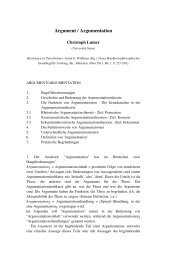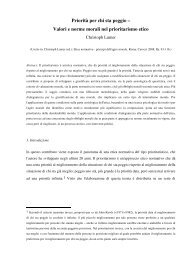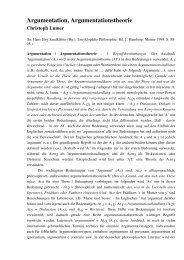What is Practical Knowledge? - Prof. Dr. Christoph Lumer
What is Practical Knowledge? - Prof. Dr. Christoph Lumer
What is Practical Knowledge? - Prof. Dr. Christoph Lumer
You also want an ePaper? Increase the reach of your titles
YUMPU automatically turns print PDFs into web optimized ePapers that Google loves.
<strong>Lumer</strong>: <strong>What</strong> Is <strong>Practical</strong> <strong>Knowledge</strong>? 4motivational force <strong>is</strong> not good. In contrast to the idea of specifying the normative condition of ourdefinition by making recourse to a given notion of the good, the attempt to define what 'practicalknowledge' <strong>is</strong> may just be the right strategy to define the 'morally ...' or 'personally good' in anoncircular way. In th<strong>is</strong> case the foregoing substantial explication of "should motivate" would haveto be replaced by a mere formal explication. I will come back to th<strong>is</strong> point below.To begin with, a sketchy justification of th<strong>is</strong> definition, can refer to the fact that anuncontested idea about practical knowledge <strong>is</strong> that such knowledge has to do with action in the wayof leading or motivating to action; otherw<strong>is</strong>e the knowledge would not be practical. However, th<strong>is</strong>relation to action may be interpreted in an empirical or in a normative way, i.e., roughly, accordingto condition 2 (practical knowledge motivates) and condition 3 (practical knowledge shouldmotivate) of the above definition. The definition says that practical knowledge has to fulfill bothconditions. We need the normative condition 3 because 'practical knowledge' <strong>is</strong> a practicalphilosophicaland normative term; without the normative condition 3 it would only be apsychological notion. As opposed to psycholog<strong>is</strong>ts, practical philosophers want to know what to dowith motivating beliefs, in particular whether there are motivating beliefs that are dec<strong>is</strong>ive from anormative point of view or that open possibilities for rationalizing our actions by acquiring more orbetter justified beliefs that lead to these actions. Or, from a different angle, ethics and theory ofpractical rationality are interested in normatively orientating people by means of knowledge withmotivational impact. -- The normative condition 3 <strong>is</strong> only contested by philosophers who deny thepossibility of a rational form of normativity. I cannot confute th<strong>is</strong> objection right now. However,the positive strategy -- set out below --, for answering the normative question, implicitly replies toth<strong>is</strong> objection.We also need the empirical condition 2 because if th<strong>is</strong> condition were not fulfilled the"practical knowledge" so defined would be practically irrelevant; people would not react at all tothe acquired "practical knowledge" or would only react with the question 'so what?'. The "practicalknowledge" would not fulfil its practical and orientating function. We would not even understandwhy it should be a reason to act. The empirical condition has been accepted, explicitly or implicitly,by nearly all theor<strong>is</strong>ts of practical rationality and by the majority of ethic<strong>is</strong>ts because they acceptthe practical requirement, i.e. the requirement that a moral conviction together with its justificationto some degree must motivate rational or prudent persons to follow that conviction. However, it hasbeen contested by a certain type of ethical external<strong>is</strong>ts, who may be called "effective external<strong>is</strong>ts"and who deny the practical requirement (viz that moral convictions, together with their respectivejustification, have to be motivational).11 To make these d<strong>is</strong>tinctions clearer it should be added that there <strong>is</strong> another, much less radical form ofexternal<strong>is</strong>m, which may be called "foundational external<strong>is</strong>m" and which says that we do not need to rely onempirically given motives to justify the content of morals . Foundational external<strong>is</strong>ts may easily accept thepractical requirement and thus be effective internal<strong>is</strong>ts, and yet deny that one has to rely on empirically givenmotives to fulfil th<strong>is</strong> requirement. A case in kind <strong>is</strong> Kant. The more radical, effective external<strong>is</strong>ts (like RichardBoyd and David Brink), however, will usually be also foundational external<strong>is</strong>ts; and foundational internal<strong>is</strong>ts(e.g. Humeans and advocates of a game-theoretical approach to ethics, as well as Richard Brandt, Frank





![Vorwort [Biographie und Laudatio Wolfgang Lenzen]](https://img.yumpu.com/40262871/1/184x260/vorwort-biographie-und-laudatio-wolfgang-lenzen.jpg?quality=85)

